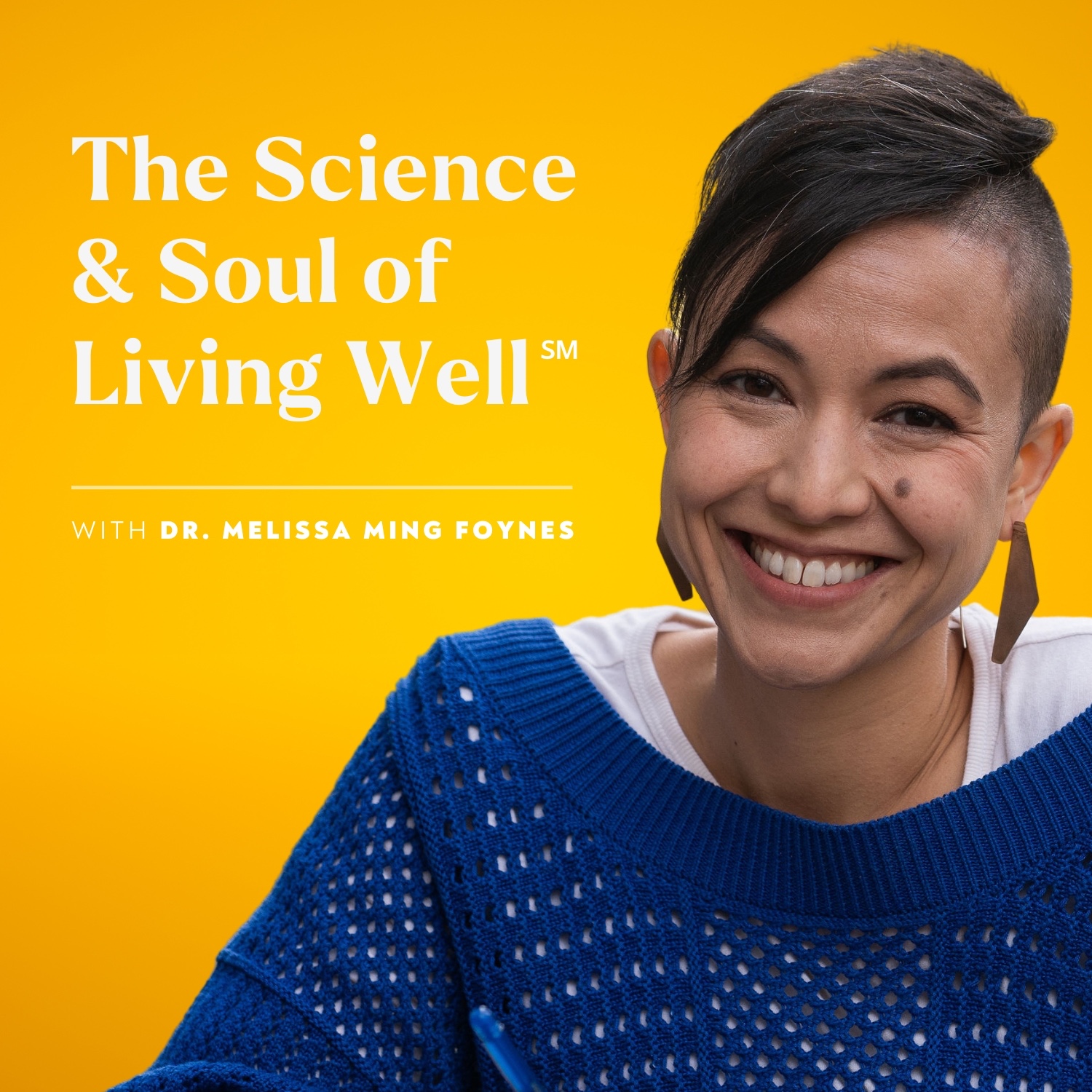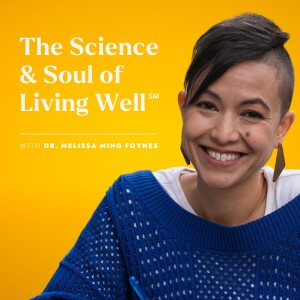
12.3K
Downloads
36
Episodes
The Science and Soul of Living Well is a podcast hosted by clinical psychologist, educator, trauma-informed mindfulness, meditation and yoga teacher, and Ayurvedic doula, Dr. Melissa Ming Foynes. Melissa and her guests dive deeply into ways to integrate evidence-based information from psychology and complementary and alternative medicine into our daily lives so that we can cultivate resilience and live with more meaning, purpose and alignment with our values in all life domains (e.g., relationships, parenting, career, physical, mental, and sexual health and well-being, spirituality, identity) even in the most stressful and darkest of times.
The Science and Soul of Living Well is a podcast hosted by clinical psychologist, educator, trauma-informed mindfulness, meditation and yoga teacher, and Ayurvedic doula, Dr. Melissa Ming Foynes. Melissa and her guests dive deeply into ways to integrate evidence-based information from psychology and complementary and alternative medicine into our daily lives so that we can cultivate resilience and live with more meaning, purpose and alignment with our values in all life domains (e.g., relationships, parenting, career, physical, mental, and sexual health and well-being, spirituality, identity) even in the most stressful and darkest of times.
Episodes

Sunday Jan 24, 2021
5 Steps for observing limits: Preventing burnout, building resilience
Sunday Jan 24, 2021
Sunday Jan 24, 2021
In today's episode, I focus on a 5-step approach for observing limits (which some people refer to as setting boundaries) and the ways in which this approach is not only a practice of self-care that can prevent burnout, but also a practice of resilience-building that fosters empowerment, compassion, and alignment with ourselves and our values. In addition to helping us care for ourselves and attend to our needs, observing limits is a necessary part of being in relationship with others and nurturing relationship health. To this end, I discuss practical strategies related to 1) identifying our limits and knowing when they’ve been crossed, 2) expressing our limits to others in compassionate ways that maximize our chances of getting our needs met, and 3) concrete tips for addressing some of the most common barriers that can arise.
To connect more with Dr. Foynes:
-
Check out the free 4-part video series on building resilience: https://melissafoynes.com/free-series
-
1:1 Coaching Program: https://melissafoynes.com/1-1-program
-
Follow @drfoynes on Instagram.
References & Additional Resources
-
Hoffman, P. D., Fruzzetti, A., & Swenson, C. (1999). Dialectical Behavior Therapy‐Family Skills Training. Family process, 38(4), 399-414.
-
Rosenberg, M. B., & Chopra, D. (2015). Nonviolent communication: A language of life: Life-changing tools for healthy relationships. PuddleDancer Press.
-
Rosenberg, M. (2012). Living nonviolent communication: Practical tools to connect and communicate skillfully in every situation. Sounds True.
Please note that the information provided in this episode does not constitute professional advice or therapy, mental health services, or health care services, and is not intended to serve as a substitue for professional advice or services. If you are struggling with a mental health crisis or need immediate assistance, please call 911 or go to your nearest emergency room.

Saturday Jan 16, 2021
The power of sexual awakening: Mindfulness, self-trust, & intimacy
Saturday Jan 16, 2021
Saturday Jan 16, 2021
On today's episode I talk with Justine Dawson, an incredibly inspiring and powerful force in the world of mindfulness, meditation, and the erotic. We highlight how difficulties and stuck points in sex often parallel the broader landscapes of our lives, and ways in which we can learn from our sex lives to deepen our knowledge of ourselves. We also talk about ways that we can cultivate a sense of self-trust, inner wisdom, and self-intimacy to enhance the power and aliveness we experience in both sex and life. We also discuss conditioning related to how we think about sex, express ourselves sexually, and feel about ourselves as sexual beings and ways in which we can break free from these effects to feel more empowered, aligned and fulfilled.
To connect more with Dr. Foynes:
-
Check out the free 4-part video series on building resilience: https://melissafoynes.com/free-series
-
1:1 Coaching Program: https://melissafoynes.com/1-1-program
-
Follow @drfoynes on Instagram.
Justine Dawson is a teacher and guide of mindfulness and the erotic. A 23-year practitioner of Insight meditation, she completed her five-year teacher training with Jack Kornfield in 2012. In addition to her education in mindfulness psychology, Justine has devoted over 13 years to practice and teaching in the realms of the erotic - sex, desire, self expression and connection. She has taught throughout the US and Europe, establishing and guiding communities of practice, as well supporting mindfulness retreats at venerable American spiritual institutions. From the inside out Justine works with people to dismantle the shame, fear and judgment that prevents them from intimacy with all aspects of life. She is a translator between worlds, bridging the rational and instinctual, mind and body, desire and responsibility. Justine is currently keeping it real in Los Angeles, CA where she teaches at Insight LA, and maintains a private practice working with individuals and couples. You can find her at justinedawson.com and on IG @justineadawson.
References & Additional Resources
Please note that the information provided in this episode does not constitute professional advice or therapy, mental health services, or health care services, and is not intended to serve as a substitute for professional advice or services. If you are struggling with a mental health crisis or need immediate assistance, please call 911 or go to your nearest emergency room.

Sunday Jan 10, 2021
Skillfully responding to harmful relationship dynamics
Sunday Jan 10, 2021
Sunday Jan 10, 2021
In today’s episode, I discuss two sets of relationship and communication patterns that have been identified by scientific research to have a harmful effect. I also share 6 key strategies that can be used not only to skillfully respond to these patterns, but also to change them in meaningful ways. Enhancing the quality of our relationships involves both identifying these patterns more clearly in the moment and having a concrete sense of how to effectively respond when they do arise.
To connect more with Dr. Foynes:
-
Check out the free 4-part video series on building resilience: https://melissafoynes.com/free-series
-
1:1 Coaching Program: https://melissafoynes.com/1-1-program
-
Follow @drfoynes on Instagram.
References & Additional Resources
-
Fruzzetti, A. (2006). The high-conflict couple: A dialectical behavior therapy guide to finding peace, intimacy, and validation. New Harbinger Publications.
-
Gottman, J. M. (2011). The science of trust: Emotional attunement for couples. WW Norton & Company.
-
Johnson, S. (2008). Hold me tight: Seven conversations for a lifetime of love. Little, Brown Spark.
Please note that the information provided in this episode does not constitute professional advice or therapy, mental health services, or health care services, and is not intended to serve as a substitue for professional advice or services. If you are struggling with a mental health crisis or need immediate assistance, please call 911 or go to your nearest emergency room.

Friday Jan 01, 2021
Neuroplasticity + The Practice of Letting Go
Friday Jan 01, 2021
Friday Jan 01, 2021
In today’s episode, we focus on what it means on a practical level to "let go" of behaviors, thought patterns, and relationships that are no longer serving us and how we can embark upon this process in a personalized, realistic, and concrete way. In addition to defining "letting go" and framing it as a practice, I highlight some key elements that are involved in the practice of letting go, including clarity, radical acceptance, and compassion, and key findings from neuroscience research that can inform and support our letting go process.
To connect more with Dr. Foynes:
-
Check out the free 4-part video series on building resilience: https://melissafoynes.com/free-series
-
1:1 Coaching Program: https://melissafoynes.com/1-1-program
-
Follow @drfoynes on Instagram.
References & Additional Resources
-
Cramer, S. C., Sur, M., Dobkin, B. H., O'brien, C., Sanger, T. D., Trojanowski, J. Q., ... & Chen, W. G. (2011). Harnessing neuroplasticity for clinical applications. Brain, 134(6), 1591-1609.
-
Demarin, V., & MOROVIĆ, S. (2014). Neuroplasticity. Periodicum biologorum, 116(2), 209-211.
-
Hanson, R. (2020). Neurodharma: New Science, Ancient Wisdom, and Seven Practices of the Highest Happiness. Harmony.
-
Hanson, R., & Hanson, F. (2020). Resilient: How to grow an unshakable core of calm, strength, and happiness. Harmony.
Please note that the information provided in this episode does not constitute professional advice or therapy, mental health services, or health care services, and is not intended to serve as a substitue for professional advice or services. If you are struggling with a mental health crisis or need immediate assistance, please call 911 or go to your nearest emergency room.

Wednesday Dec 23, 2020
The synergy of values, intentions & goals in creating meaningful change
Wednesday Dec 23, 2020
Wednesday Dec 23, 2020
In today’s episode, we focus on the importance of values, intentions, and goals in creating meaningful changes in our lives. We begin by clarifying the differences between values, intentions, and goals and highlighting how all three are important and interrelated agents of change. Together, they have a synergistic effect and are more powerful than any one element on its own. We’ll also hone in on 7 key strategies for approaching a change-oriented process and effectively achieving the changes we desire in a way that is purpose-driven, sustainable, and grounded in the real practicalities of our lives.
To connect more with Dr. Foynes:
-
Check out the free 4-part video series on building resilience: https://melissafoynes.com/free-series
-
1:1 Coaching Program: https://melissafoynes.com/1-1-program
-
Follow @drfoynes on Instagram.
References & Additional Resources
-
Doran, G. T. (1981). There's a SMART way to write management's goals and objectives." and Miller. Arthur F. & Cunningham, James A" How to avoid costly job mismatches" Management Review, 70(11).
Please note that the information provided in this episode does not constitute professional advice or therapy, mental health services, or health care services, and is not intended to serve as a substitue for professional advice or services. If you are struggling with a mental health crisis or need immediate assistance, please call 911 or go to your nearest emergency room.

Tuesday Dec 15, 2020
The cost of *not* grieving
Tuesday Dec 15, 2020
Tuesday Dec 15, 2020
On today's episode we discuss important findings from scientific research that can deepen our understanding of grief and help us work toward a compassionate conceptualization of grief and the purpose it serves in our lives. We also focus on 5 key considerations that can not only support us as we navigate grief individually and collectively but also enhance the support and solace we offer to others who are grieving.
To connect more with Dr. Foynes:
-
Check out the free 4-part video series on building resilience: https://melissafoynes.com/free-series
-
1:1 Coaching Program: https://melissafoynes.com/1-1-program
-
Follow @drfoynes on Instagram.
References & Additional Resources
-
https://www.cnn.com/2018/08/10/us/orca-whale-still-carrying-dead-baby-trnd/index.html
-
Stroebe, M., & Schut, H. (2010). The Dual Process Model of Coping with Bereavement: A decade on. Omega: Journal of Death and Dying, 61(4), 273–289.
-
Wolfelt, A. (2018). Grief Day by Day: Simple, Everyday Practices to Help Yourself Survive and Thrive. Companion Press: Fort Collins, CO.
-
Cacciatore, J., & Flint, M. (2012). ATTEND: Toward a mindfulness-based bereavement care model. Death studies, 36(1), 61-82.
Please note that the information provided in this episode does not constitute professional advice or therapy, mental health services, or health care services, and is not intended to serve as a substitue for professional advice or services. If you are struggling with a mental health crisis or need immediate assistance, please call 911 or go to your nearest emergency room.
